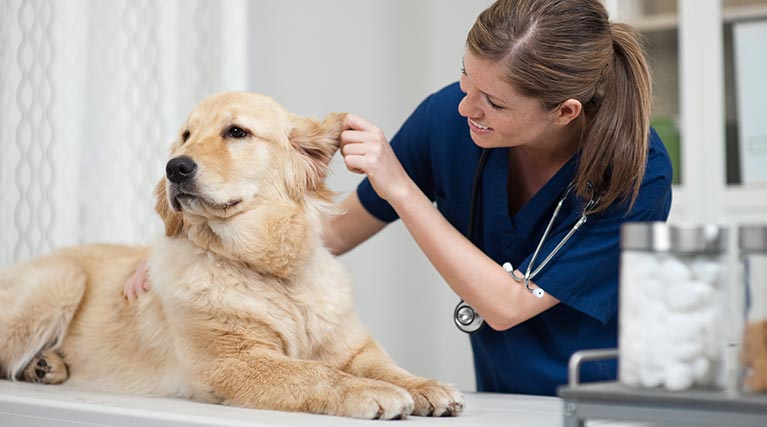Picking the very best Veterinarian Enterprise for Timely and Compassionate Pet Treatment
Picking the very best Veterinarian Enterprise for Timely and Compassionate Pet Treatment
Blog Article
Inoculation Guidelines From Your Relied On Vet
Inoculation guidelines provided by your trusted veterinarian play a critical function in safeguarding your family pet's wellness and well-being. Additionally, attending to typical misconceptions surrounding vaccinations can additionally enhance animal owners' confidence in these preventive procedures.

Significance of Inoculations
Inoculations play a crucial role in guarding animals against a variety of preventable illness. By promoting the body immune system to recognize and deal with specific pathogens, injections significantly decrease the incidence of infectious illness that can influence a family pet's health and longevity. Not only do vaccinations shield individual animals, however they also contribute to herd resistance, therefore minimizing the total prevalence of diseases in the animal population.
Prompt inoculations aid to reduce the spread of conditions such as rabies, parvovirus, and distemper, which can have extreme effects for both people and family pets. Furthermore, inoculations are frequently a demand for boarding facilities, brushing services, and dog parks, making them important for those that wish to socialize their pet dogs.

Core Vaccines for Pet Dogs
While the particular inoculation needs of animals can vary based upon individual elements, core vaccines are globally suggested to protect against one of the most major and usual illness (Pet Vaccinations). Core vaccinations are those considered important for all pets, despite their way of living or geographical place, as they safeguard versus extremely contagious and possibly fatal diseases
For pet dogs, the core injections include those for canine distemper, parvovirus, adenovirus (liver disease), and rabies. Canine distemper is a viral illness that influences the breathing, intestinal, and nerves. Parvovirus is recognized for causing extreme gastrointestinal health problem, particularly in pups. Adenovirus can lead to liver condition, while rabies is a zoonotic disease that presents a danger to both pet dogs and people.
In cats, core injections incorporate feline panleukopenia, feline calicivirus, feline herpesvirus (rhinotracheitis), and rabies. Feline panleukopenia is a highly contagious viral condition that affects the immune system and intestinal tracts. Calicivirus and herpesvirus are major contributors to upper respiratory infections in felines, while rabies continues to be an essential concern for public wellness.
Speak with your veterinarian to ensure your pets obtain their core inoculations on time.
Non-Core Vaccines Explained
Non-core vaccines are tailored to attend to details threats linked with an animal's exposure, way of life, and atmosphere to specific illness. Unlike core injections, which are generally suggested for all family pets, non-core injections are thought about based on private conditions. These injections are especially important for pets that may encounter one-of-a-kind microorganisms because of their geographical area, travel behaviors, or tasks.
Examples of non-core injections include those for Bordetella bronchiseptica, which is linked to kennel cough, and Lyme illness, created by ticks. visit the website Pets that frequently communicate with various other animals, such as those in boarding centers, canine parks, or brushing environments, might take advantage of Bordetella inoculation. If you live in an area where Lyme condition is widespread, vaccinating against this condition can be a sensible option for outdoor-loving pets.
Other non-core injections may consist of those for leptospirosis, canine flu, and feline leukemia, depending on the details danger factors existing. It is important to have a thorough conversation with your veterinarian about your pet's way of living and the possible need for these vaccines, making certain a tailored vaccination strategy that best shields your hairy pal.
Inoculation Set Up Overview

As pet dogs grow, it is very important to stick to the recommended booster vaccinations. Veterinarian Enterprise. For grown-up animals, core vaccinations are typically offered every one to three years, depending upon the certain vaccine and neighborhood guidelines. Non-core vaccinations might be recommended click this based upon way of life factors and local illness prevalence, requiring a customized approach
Routine vet check-ups are vital for updating inoculation routines. Your veterinarian can provide support on the most suitable booster shots for your pet, factoring in age, wellness status, and environmental risks. By remaining aggressive and educated, animal owners can guarantee their hairy buddies get prompt and efficient inoculations, thus protecting their health and wellness and well-being throughout their lives.
Common Myths About Injections
False impressions about pet dog vaccinations can result in complication and reluctance among pet dog proprietors relating to the booster shot procedure. One prevalent myth is that injections are unneeded for indoor animals. While it holds true that interior pet dogs face lower dangers, they are not totally immune to conditions, as pathogens can be presented via numerous means, including human clothes and other pets.
Another misconception is that vaccinations can cause the diseases they aim to avoid. Actually, most vaccines contain inactivated or undermined virus, which can not cause condition in healthy and balanced pets. Some animal owners also believe that their pets should not be vaccinated if they are already healthy and balanced; nonetheless, inoculations are an aggressive action that assists avoid the onset of health problem.
In addition, many animal owners are afraid that injections will certainly lead to lasting wellness issues. The benefits of vaccination-- shielding pets from potentially lethal diseases-- far exceed the threats.
Conclusion
In recap, adherence find out to vaccination guidelines is vital for guaranteeing the health and durability of animals. Resolving usual misconceptions surrounding vaccinations further strengthens the significance of informed decision-making in family pet treatment.
Not only do vaccinations protect private pets, yet they likewise contribute to herd resistance, therefore lowering the overall prevalence of conditions in the pet population.
Misconceptions concerning animal inoculations can lead to confusion and hesitation amongst pet dog proprietors pertaining to the immunization procedure. While it's true that indoor family pets face lower risks, they are not entirely immune to illness, as pathogens can be introduced with various methods, including human clothes and various other family pets.
Some pet owners additionally believe that their pets must not be immunized if they are currently healthy; however, vaccinations are a proactive procedure that aids avoid the onset of health problem.
The advantages of inoculation-- shielding animals from possibly serious illness-- far outweigh the dangers.
Report this page